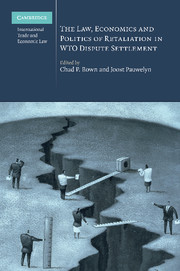Book contents
- Frontmatter
- Contents
- List of tables and figures
- Contributors
- Introduction: trade retaliation in WTO dispute settlement: a multi-disciplinary analysis
- PART I Background and goal(s) of WTO retaliation
- PART II A legal assessment after ten arbitration disputes
- PART III An economic assessment after ten arbitration disputes
- PART IV The domestic politics and procedures for implementing trade retaliation
- 8 The United States' experience and practice in suspending WTO obligations
- 9 The European Community's experience and practice in suspending WTO obligations
- 10 The politics of selecting trade retaliation in the European Community: a view from the floor
- 11 Canada's experience and practice in suspending WTO obligations
- 12 Is retaliation useful? Observations and analysis of Mexico's experience
- 13 Procedures for the design and implementation of trade retaliation in Brazil
- 14 Retaliation in the WTO: the experience of Antigua and Barbuda in US–Gambling
- PART V Problems and options for reform
- PART VI New frontiers and lessons from other fields
- Index
9 - The European Community's experience and practice in suspending WTO obligations
Published online by Cambridge University Press: 26 February 2010
- Frontmatter
- Contents
- List of tables and figures
- Contributors
- Introduction: trade retaliation in WTO dispute settlement: a multi-disciplinary analysis
- PART I Background and goal(s) of WTO retaliation
- PART II A legal assessment after ten arbitration disputes
- PART III An economic assessment after ten arbitration disputes
- PART IV The domestic politics and procedures for implementing trade retaliation
- 8 The United States' experience and practice in suspending WTO obligations
- 9 The European Community's experience and practice in suspending WTO obligations
- 10 The politics of selecting trade retaliation in the European Community: a view from the floor
- 11 Canada's experience and practice in suspending WTO obligations
- 12 Is retaliation useful? Observations and analysis of Mexico's experience
- 13 Procedures for the design and implementation of trade retaliation in Brazil
- 14 Retaliation in the WTO: the experience of Antigua and Barbuda in US–Gambling
- PART V Problems and options for reform
- PART VI New frontiers and lessons from other fields
- Index
Summary
Introduction: the EC's experience and the objectives of trade sanctions
As is known, the European Community (EC) joined relatively late the club of WTO members obtaining an authorisation from the Dispute Settlement Body (DSB) to suspend obligations, after starting the WTO era as the WTO member against which such suspension was authorised in two cases. Since then, however, the EC has accumulated relevant experience. To date, the EC is among the few WTO members having obtained DSB authorisations to suspend obligations, and one of even fewer WTO members to also use such authorisations. In addition, the EC has been following the developments in this area with great attention.
There is much debate over the precise objective of the trade sanctions in WTO dispute settlement, namely whether they are to serve to induce compliance or whether they are intended to redress the imbalance in reciprocal benefits created by the breach (or other nullification or impairment), or both, and to what extent exactly. While the debate over this question so far has not resulted in an unequivocal answer accepted by all actors, or at least authoritatively declared by the WTO's judicial instances, one can say with more confidence that the EC leans toward the view that the main or predominant purpose of trade sanctions is to induce compliance.
This question of the purpose of trade sanctions can also be viewed less from the central perspective of the WTO as an institution and an agreement between more than 150 members, and more from the individual perspective of individual complainants in cases where non-compliance persists.
- Type
- Chapter
- Information
- Publisher: Cambridge University PressPrint publication year: 2010
- 2
- Cited by



